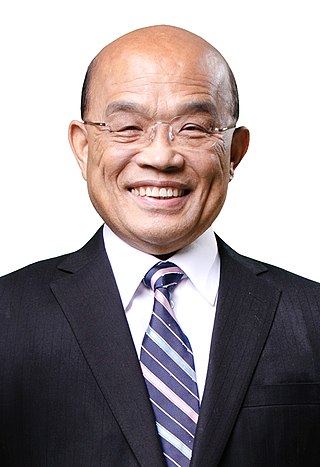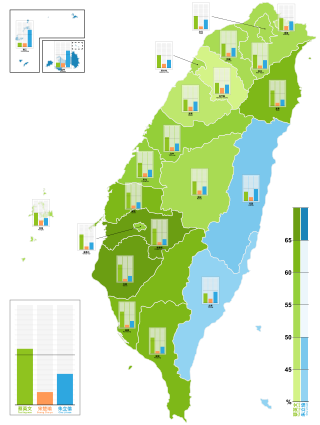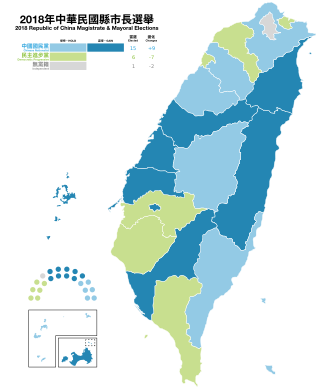
The Democratic Progressive Party (DPP) is a centre to centre-left Taiwanese nationalist political party in Taiwan. As the dominant party in the Pan-Green Coalition, one of the two main political camps in Taiwan, the DPP is currently the ruling party in Taiwan, leading a minority government that controls the presidency and the central government.

Taiwan, officially the Republic of China (ROC), is governed in a framework of a representative democratic republic under a five-power system first envisioned by Sun Yat-sen in 1906, whereby under the constitutional amendments, the President is head of state and the Premier is head of government, and of a multi-party system. Executive power is exercised by the Executive Yuan. Legislative power is vested primarily in the Legislative Yuan. Taiwan's judiciary is independent of the executive and the legislature. In addition, the Examination Yuan is in charge of validating the qualification of civil servants, and the Control Yuan inspects, reviews, and audits the policies and operations of the government.

The Pan-Blue coalition, Pan-Blue force or Pan-Blue groups is a political coalition in the Republic of China (Taiwan) consisting of the Kuomintang (KMT), People First Party (PFP), New Party (CNP), Non-Partisan Solidarity Union (NPSU), and Young China Party (YCP). The name comes from the party color of the Kuomintang.

The People First Party is a centrist or centre-right political party in Taiwan.

Su Tseng-chang is a Taiwanese politician who served as premier of the Republic of China (Taiwan) from 2006 to 2007 and again from 2019 to 2023. He was the chairman of the Democratic Progressive Party in 2005 and from 2012 to 2014. Su served as Chief of Staff to President Chen Shui-bian in 2004. He is currently the longest-serving Democratic Progressive premier in history.

This is a timeline of the Republic of China.

Tsai Ing-wen is a Taiwanese retired politician who served as the 7th president of the Republic of China (Taiwan) from 2016 to 2024, and was the first woman to hold that position. A member of the Democratic Progressive Party (DPP), she intermittently served as chair of the DPP from 2008 to 2012, 2014 to 2018, and 2020 to 2022.

Presidential elections were held in Taiwan on 14 January 2012. The election was held concurrently with legislative elections. It was the fifth direct election for the President of the Republic of China. Prior to 1996, the President was elected by the ROC's National Assembly and not directly by the people.

Lai Ching-te, also known as William Lai, is a Taiwanese politician and former physician who is currently serving as the 8th president of the Republic of China (Taiwan) since May 2024. He is the third member of the Democratic Progressive Party (DPP) to assume the office of president and the first whose predecessor was also a DPP member. He is also the third incumbent vice president to succeed to the presidency and the first to assume the office through election instead of immediate succession. He has also served as the chair of the DPP since 2023.
The Taiwan consensus is a Taiwanese political term, which was coined in August 2011 by Democratic Progressive Party (DPP) chair Tsai Ing-wen, and is intended to replace the "1992 consensus", which was the basis of DPP's negotiations between Taiwan and the mainland China until now.

Su Jia-chyuan is a Taiwanese politician of the Democratic Progressive Party (DPP).

Cho Jung-tai is a Taiwanese politician who is the premier of the Republic of China (Taiwan) since 2024. He served on the Taipei City Council from 1990 to 1998, when he was first elected to the Legislative Yuan. Cho remained a legislator through 2004, when he was appointed deputy secretary-general to the president during the Chen Shui-bian administration. During Frank Hsieh's 2008 presidential bid, Cho assumed the post of Secretary-General of the Democratic Progressive Party. He returned to public service in 2017, as secretary-general of the Executive Yuan under Premier William Lai. In 2019, Cho succeeded Tsai Ing-wen as leader of the Democratic Progressive Party. He remained leader of the party until May 2020, when Tsai resumed the role.
General elections were held in Taiwan, officially the Republic of China, on Saturday, 16 January 2016 to elect the 14th President and Vice President of the Republic of China, and all 113 members of the ninth Legislative Yuan:

Presidential elections were held in Taiwan on 16 January 2016. Democratic Progressive Party (DPP) candidate Tsai Ing-wen with her independent running mate Chen Chien-jen won over Eric Chu of the Kuomintang (KMT) and James Soong of the People First Party (PFP). Tsai became the first female president in Taiwan, as well as in the Chinese-speaking world.

Legislative elections were held in Taiwan on 16 January 2016 to elect all 113 members in the Legislative Yuan, alongside presidential elections. The Democratic Progressive Party (DPP) led by Tsai Ing-wen, who also won the presidential election on the same day, secured a majority for the first time in history by winning 68 seats. The ruling Kuomintang (KMT) lost both the presidency and its legislative majority and returned to the opposition.

Local elections were held on 24 November 2018 in Taiwan, to elect county magistrates, county (city) councilors, township mayors, township councilors and chiefs of village (borough) in 6 municipalities and 16 counties (cities). Elected officials would serve a four-year term. Polling stations were open from 08:00 to 16:00 on the election day.

Presidential elections were held in Taiwan on 11 January 2020 alongside Legislative Yuan election. Incumbent president Tsai Ing-wen and former premier Lai Ching-te of the Democratic Progressive Party (DPP) won the election, defeating Kaohsiung mayor Han Kuo-yu of the Kuomintang (KMT) and his running mate Chang San-cheng, as well as third-party candidate James Soong.

The Taiwan People's Party (TPP) is a centre-left political party in Taiwan. It was formally established on 6 August 2019 by Ko Wen-je, who serves as its first and current chairman. The party considers itself as an alternative third party to both the Democratic Progressive Party and Kuomintang.
Wang Liqiang, or William Wang, is a self-proclaimed former spy for China. In November 2019, Wang sought political asylum in Australia, claiming to be a spy who was involved in the People's Republic of China's intervention in the affairs of Hong Kong SAR and Taiwan. The factual accuracy of his claims has been disputed, and some experts suggested that at best, he could be no more than a low-level operative. China has claimed that Wang's allegations were "absurd" and that he is a "fraud".

Lii Wen is a Taiwanese journalist and politician.


















